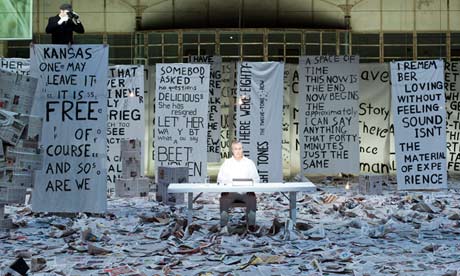Cut-up or collage, the challenge this month is to concoct something new from other people's words
One night sometime in the early 1930s a New Jersey doctor left a note for his wife on the door of their fridge. He looked at it again and saw something he hadn't noticed when first writing it down, something that made him write it out anew. The doctor was William Carlos Williams and the note became This is just to say, one of the best-known and most widely discussed "found poems" ever written.
Other examples of the genre include Howard Nemerov's Found Poem; Charles Reznikoff's Slave Sale: New Orleans, drawn from historical documents and records; Ian Hamilton Finlay's lyrics from nothing but the names, and sometimes serial numbers, of Scottish fishing boats; William Burroughs' and Brion Gysin's Cut-up poems (explained in The Third Mind; Cento, a collage from existing poems found in Latin poets of the third and fourth centuries; John Cage's mesostic poems, acrostics constructed from other writers' works.
And so this month's Poster poems challenge is to write found/collage/cut-up poems of your own. You can use any kind of source text or texts that takes your fancy. Think of it as being a bit like making scrambled eggs; everyone has their own favourite recipe, but if you mix the ingredients well you're bound to end up with a tasty treat. So don't just sit there, get scrambling.More about this month's Poster poems: Found poetry by Billy Mills, Poetry at the Guardian

No comments:
Post a Comment